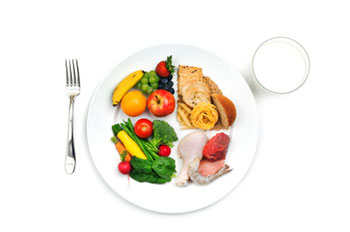
Dieting is the practice of eating certain foods or portions in order achieve or maintain a controlled weight. In most cases, dieting is used in combination with physical exercise in order to lose weight. Some diets especially for athletes or bodybuilders are followed a diet to gain weight, usually muscle. Once the desired weight is reached diets can also be followed in order to maintain it.
There are four main categories used to describe diets that are meant to promote weight loss. These categories are; low-fat, low-carbohydrate, low calories and very low calorie. Low-fat diets involve the reduction of the percentage of fat in one's diet. Calorie consumption is therefore reduced so that there is less fat is consumed. Low carbohydrate diets are relatively high in protein. Two widely known low-carbohydrate diets include Atkins diet and Protein Power. Low-calorie diets are very commonly used and produce an energy deficit of 500-1000 calories per day which can lead to 1 to 2 pounds being shed per week. Weight watchers and Dash diet are widely used Low-calorie diets. Very low-calorie diets provide only 200-800 calories per day and is subjecting the body to starvation. Protein intake is maintained, but calories are limited from fats and carbohydrates. These diets are not recommended for general use because they can lead to major health complications and should be closely monitored by a doctor to prevent adverse side effects.
Many people use the practice of calorie counting when it comes to dieting. This practice is done by choosing foods that are lower in calories are limiting portion sizes to ensure that the daily caloric intake is not over what is recommended. Detox diets are common in preparing the body for another diet. These diets claim to eliminate the undesirable toxins and sludge that is built up in the human body. They do not necessarily claim to help one lose weight, rather to prepare the body for new dietary habits.
When dieting a person should consider their Basal Metabolic Rate which refers to the amount of calories are person burns while at rest. This rate is influenced by a person’s total weight as well as their amount of muscle. The greater the amount of muscle, the more calories a person can burn at rest. If a person has more muscle they can ingest more calories without gaining weight, if a person is higher in fat the additional amount of calories will contribute to greater weight gain. Maintaining muscle mass while losing weight is a key factor to reach one’s ideal weight.
There are many different diets to choose from whether it is for weight loss, weight gain or just all over health. It is best to research these diets and find something that you will be able to stick too. Many people choose diets that are far too difficult to stick to which results in yo-yo dieting. Dieting can help you to reach your weight loss goals, but exercise is very important as well. When going on a diet ensuring that you are still receiving the proper nutrients is very important. Supplements and vitamins can help to assist, but make sure that your diet of choice is still healthy and not too drastic. If you are planning on dieting, talk to your local health care provider who can assist in choosing the diet that is best for you while maintaining your health at the same time.